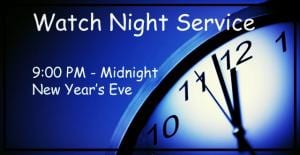
Established in African-American communities on December 31, 1862, Watch Night is a gathering to celebrate the Emancipation Proclamation becoming law. When the clock struck midnight on January 31, 1863, all slaves in the Confederate States were proclaimed free. Since that date … African-Americans have celebrated the good news of freedom in local churches on New Year’s Eve. Like the slaves who first gathered while the Civil War raged on, we proclaim freedom for all captives in Jesus’ name, knowing that for millions, freedom is not a reality. Our celebration is a commitment to join modern-day slaves and undocumented workers in their struggle for justice.
That’s how my favorite prayer book describes what others call New Year’s Eve. The prayer book is Common Prayer: A Liturgy for Ordinary Radicals. This post is another in the series about people I call “Ordinary Radicals.” In this case the ordinary radicals are the people of color and of every other oppressed group in the United States. Watch Night can be a time not only for celebrations in Black churches but also for dominant groups to search their souls about the long road to true freedom for all that still remains.
The first Watch Night
Booker T. Washington was born six years before Lincoln issued the famous Proclamation. Later he wrote about the first Watch Night:
As the great day grew nearer, there was more singing in the slave quarters than usual. It was bolder, had more ring, and lasted later into the night. Ture, they had sung those same verses before, but they had been careful to explain that the ‘freedom’ in these songs referred to the next world, and had not connection with life in this world. Now they gradually threw off the mask. [They] were not afraid to let it be known that the ‘freedom’ in their songs meant freedom of the body in this world. (Common Prayer)
On December 31 Blacks across the country, slaves and free, gathered in churches and homes, waiting for the Emancipation Proclamation to become law. African American Registry notes that another name for this night is Freedom’s Eve. The tradition “still brings us together at this time every year to celebrate ‘how we got over.’” Church services begin “anywhere from 7 p.m. to 10 p.m.” and go on until midnight.
Lincoln’s other motive
Lincoln believed that participation by Black people would be essential to the Union’s success in the Civil War. African Americans, says the African American Civil War Museum, “were ‘watching’ for the opportunity to fight for freedom.” A preacher in Washington, D.C., Henry M. Turner, said:
Abraham Lincoln can get anything he wants from the colored people here from a company to a corps. I would not be surprised to see myself carrying a musket before long.
Turner became a chaplain in the Union army.
The Emancipation Proclamation was a war measure. It freed slaves in the Southern states only. Jefferson Davis, the Confederate president, later in 1863 gloated that the Union could not subdue the South on its own, i.e., without the help of blacks.
The Civil War Museum goes on to say that the celebrations of Watch Night commemorate a “watching for.” Blacks watched for government policy to align “with the prayers of the oppressed.” We celebrate the “contributions of African descent patriots.”
[A]rmed with the musket and the Emancipation Proclamation, [they] marched on to victory over secession and slavery.
Image credit: Solomon Community Temple, United Methodist church











